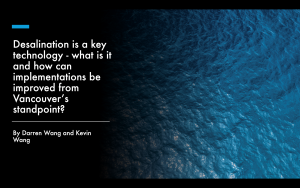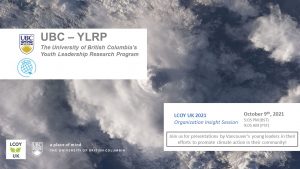Elevating the voices of young people to protect the future of our planet
The Earth’s climate is rapidly changing, impacting weather, landscapes and resources that are key to planetary survival. As outlined in the 13th Sustainable Development Goal (SDG 13), the United Nations (UN) aspires to engage communities in urgent action to combat climate change and its impacts. Many of these goals are organized through the UN Framework Convention on Climate Change (UNFCCC). Faced with increasing global uncertainty, it is now more important than ever to inspire the next generation to understand and mitigate these complex processes. The United Nations Children’s Fund (UNICEF) and other multilateral organizations are increasingly turning their attention to engaging future leaders of the world in climate action.
To advance these objectives, the University of British Columbia (UBC) has designed a program to enhance knowledge of the nature and impacts of climate change at the high school level. The course will provide an overview of environmental protection, climate change impacts, energy efficiency, carbon emissions reduction and global/local carbon trade. The geographic focus includes both global and local perspectives, with an emphasis on issues specifically relating to British Columbia (BC). Students will take part in research projects related to climate change science, technology, and policy.
UBC-YLRP Pilot Program
A pilot version of the program was launched this year, with seven high school students selected to attend a 3-month interactive course on climate change that culminated in the completion of group research projects. The process included project proposal, revisions, and implementation. The students’ projects addressed many elements of climate action:
The students were encouraged to choose issues they are passionate about and were supported by the UBC’s wealth of knowledge and extensive expertise. The projects are all in their finals stages, and students are expected to present results on October 9th, 2021. While the students’ projects are local, they have opportunities to share their work with international communities, like the UK Local Conference of Youth (LCOY), to broaden their network of youth engagement. We believe that connecting these students with other like-minded, keen, enthusiastic, and committed youth will advance their own capacity to make a change.
General Overview of Program
Students are expected to attend a 2-hour class once a week during a given semester. The course will begin with an overview of scientific knowledge of climate and climate change, followed by a review of the impacts of climate change on social, economic and environmental issues at both global and local (BC) levels. Several local climate mitigation and adaptation projects will be identified and used as case studies. The students will learn how to establish local climate change mitigation goals and achieve them through conceiving and implementing research projects.
|
Course Design: As mentioned above, the students will be expected to attend 12 lectures from March to July (see the tentative program schedule). The course content will largely be project-based, with an emphasis on in class participation and group discussions. The course will begin with an overview of climate science, technology, and policy, followed by a review of research skills. All expected outputs will be approached through group work (2-3 students per group). |
Expected Outputs: Course deliverables include a research proposal, research report, and research presentation. The most outstanding final projects will be selected to present their findings at a high-profile international climate conference. Depending on the subject and quality of their research projects, we will try our best to find relevant international/regional workshop/seminars for other students to present at.
|
|
Expected Program Costs: Expected sponsorship from supporting organizations for general program operations is $4,000 CAD/student.
|
Program Instructors: Program instructors/mentors will include prominent faculty members from UBC, as well as guest professors from Yale and Stanford. |
Program Length: TBD
Target Student Level: Grade 9 -11
Geographic scope: Will work with local groups to provide students with local context and opportunities for practical application
Tentative Program Schedule



